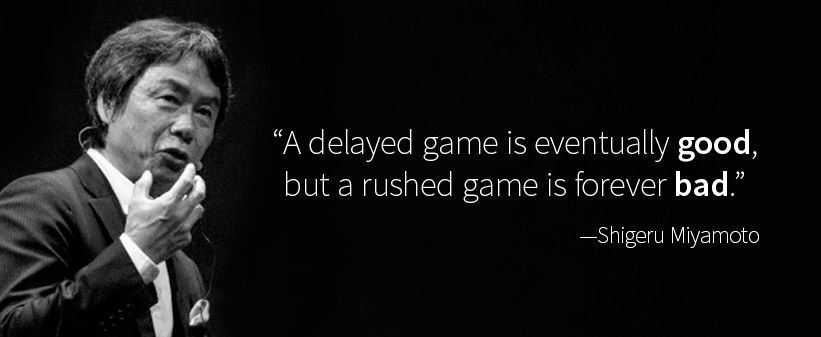Is Miyamoto’s quote about delays really irrelevant nowadays?
By pauljeremiah 12 Comments

Anytime this quote is brought up nowadays, it’s either dismissed outright or treated as a joke, but does the quote have a place in the current gaming era?
It’s easy to look at the quote and say, “Well, a delayed game can still be bad, and a rushed game can be updated, so the quote means nothing.” But unfortunately, despite both of these being indisputable facts, games still get released in incomplete states, which leads to a bad reputation that often persists even if the game is updated to be good in the future.
I could go into all sorts of games such as No Man’s Sky, Sea of Thieves and even Fallout 76 to the extent that they were released in unfinished states, which led to them being panned at first but were eventually updated. While these games do have dedicated fan bases, who enjoy the games for their current state, to everyone else, the first thing that will come to mind is the horrid state they were released in. For most of these types of games, the size and passion of the fan base certainly do not outmatch the outsiders who view the games in a negative light. The only game I can think of that escaped the stigma of its launch disaster is Street Fighter V.
Perhaps the most egregious example of why this quote is still relevant comes from Nintendo itself.
I’m sure we’re all aware of Nintendo’s current practice of releasing games in barebones states and then progressively adding new content over time. I believe the first significant example of this was Kirby Star Allies, which disappointed most fans upon release but eventually got updated with many new characters that made the game feel more complete. Nintendo Switch Sports also seems to be going down this route, which has also been met with backlash from fans. However, two examples stick out above the rest.
The first is Animal Crossing: New Horizons. Despite its massive success, many fans were not happy that many features present in previous games were absent from the game at launch, such as art, gyroids, diving, and the roost. While these features were eventually added to the game over time, fans were still not happy. Whenever a new feature was added, people were delighted to see the game feel more complete, but the most common response I saw to these updates was along the lines of “Why wasn’t this in the game at launch?” So despite the rushed game being “eventually good”, its initial barebones release still impacts people's opinion of it.
The second significant example is the most recent; Mario Strikers: Battle League. Once again, fans were not happy with the game being released despite being very light on content, with notable missing characters and stages. And once again, despite Daisy and a new stadium being announced just a few days ago, the most frequent response I see to the update is one complaining about them not being in the game at launch.
There are still consequences to rushing out games and updating them later, and while it’s too early to tell if they’ll be considered “bad forever”, Animal Crossing’s launch is still in the minds of fans two years later; so….
The people complaining about the drip-feeding of content are the minority of the player base. They don’t have a significant impact if they boycott incomplete games. Still, it’s the same minority that seems to believe the quote about delays has no place in the modern gaming paradigm.
To anyone complaining about Nintendo’s practice of rushing out games in bare-bones states, I must ask: would you rather these games get delayed by a year and a half (the time it took for New Horizons to get its last major update) to be released in complete states?

13 Comments